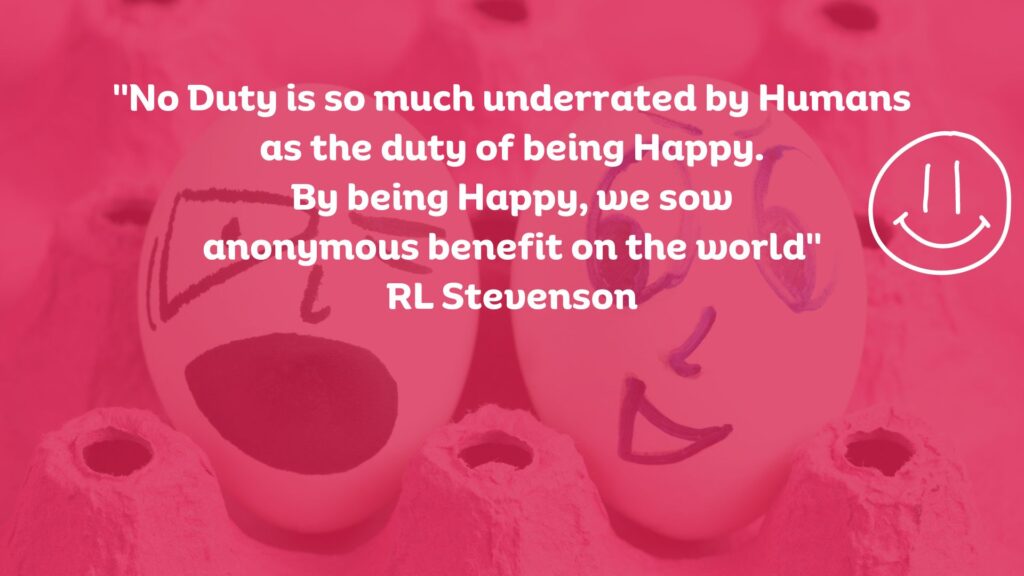Dr. Fakira Mohan Nahak
Indian philosophy has a rich tradition of exploring the nature of happiness and well-being. It is clearly evident from the ancient texts and scriptures. The Bhagavad Gita explores the nature of the self and the ultimate goal of life. In the Gita, Krishna tells Arjuna that true happiness comes from finding inner peace and contentment. He says, “One who is happy within, who rejoices within, and who is illumined within, such a yogi attains absolute freedom and the supreme state.”

The Upanishads described happiness as a state of inner peace and contentment that comes from realizing the true nature of the self. The Brihadaranyaka Upanishad says, “In the joy of the self lies the joy of the universe. All else is but fleeting.” The Yoga Sutras of Patanjali described happiness as a state of mind that comes from practicing yoga and achieving inner peace. Maharshi Patanjali says, “When the mind is at peace, the soul is happy.” Similarly, the the Jataka tales of Buddhist tradition says “The greatest happiness comes from making others happy”.
These examples show that happiness has been a topic of exploration and discussion in Indian philosophy for thousands of years. The texts explore the nature of happiness, how it can be achieved, and the role it plays in our lives. They emphasize the importance of inner peace, contentment, and compassion in achieving happiness and well-being. The concept of happiness has been around for thousands of years, and philosophers have debated its definition and meaning for centuries. Happiness is often defined as a state of well-being and contentment that is characterized by positive emotions such as joy, satisfaction, and fulfilment. It is a state that we all strive to achieve, and it is something that we all deserve.
The International Day of Happiness aims to raise awareness of the importance of happiness in our lives and the lives of those around us. It is a day to celebrate the things that make us happy and to focus on the positive aspects of our lives. It is also a day to reflect on the things that we can do to create more happiness in the world. International Day of Happiness is celebrated every year on March 20th to highlight the importance of happiness and well-being in people’s lives. The day was first celebrated in 2013 when the United Nations General Assembly declared March 20th as the International Day of Happiness. The day aims to promote the idea that happiness is a fundamental human right and that we should all strive to create a more peaceful and prosperous world that is centred on happiness.
There are many things that we can do to create more happiness in our lives and the lives of others. One of the most important things is to cultivate a positive attitude and to focus on the good things in our lives. This can be achieved through practices such as gratitude, mindfulness, and meditation. By focusing on the positive aspects of our lives, we can increase our happiness and well-being.
Similarly, to create more happiness in the world is to practice kindness and compassion. This can be done through simple acts of kindness such as smiling at someone, holding the door open for someone, or giving a compliment or extending a helping hand to someone who never expected such things from us. By being kind and compassionate to others, we can create a ripple effect that spreads happiness and positivity throughout the world.

The International Day of Happiness also highlights the importance of social connections and relationships. Research has shown that strong social connections are one of the most important factors in promoting happiness and well-being. By fostering meaningful relationships with family, friends, and colleagues, we can increase our happiness and create a sense of belonging.
In addition to promoting happiness and well-being in our personal lives, we must think about how we can create a happier and more peaceful world. This can be done through promoting peace, justice, and equality. By working to create a world that is more just and equal, we can create a world that is more conducive to happiness and well-being. One of the key ways to create a more just and equal world is to address the root causes of poverty and inequality. This can be done through initiatives such as education and training programs, access to healthcare and clean water, and the promotion of economic development. By addressing these issues, we can create a more just and equal world that is more conducive to happiness and well-being.
Along with this we have to promote environmental sustainability for a peaceful world. Climate change and environmental degradation are major threats to our well-being and the well-being of future generations. By promoting environmental sustainability and working to reduce our carbon footprint, we can create a more sustainable and prosperous world that is more conducive to happiness and well-being. The International Day of Happiness is an important reminder that happiness and well-being are fundamental human rights that we should all strive to achieve. The International Day of Happiness is an important day that reminds us of the importance of happiness and well-being in our lives and the lives of those around us. It is a day to celebrate the things that make us happy and to focus on the positive aspects of our lives. It is also a day to reflect on the things that we can do to create more happiness in the world.
Happiness is not only important for individual well-being, but it is also crucial for building strong and healthy communities. Happy people are more likely to contribute to society, be productive at work, and engage in positive social interactions. Therefore, it is essential to prioritize happiness as a key component of public policy. Governments and policymakers play a critical role in creating an environment that promotes happiness and well-being.
One example is the Bhutanese government, which has prioritized the well-being of its citizens over economic growth. Bhutan measures its progress using the Gross National Happiness (GNH) index, which includes factors such as equitable social development, cultural preservation, and environmental sustainability. Similarly, the United Arab Emirates (UAE) has launched a Ministry of Happiness and Well-being to promote happiness and positivity in the country. The ministry’s initiatives include promoting volunteerism, enhancing work-life balance, and launching happiness and positivity campaigns.
This international occasion also highlights the importance of mental health and well-being. Mental health issues such as depression, anxiety, and stress can have a significant impact on a person’s happiness and overall well-being. Therefore, it is crucial to prioritize mental health care and support services to ensure that people can access the help they need.
Happiness is not just a personal feeling, but it is also crucial for building strong and healthy communities. Governments and policymakers play a critical role in creating an environment that promotes happiness and well-being. By prioritizing happiness as a key component of public policy, we can create a more just and equal world that is more conducive to happiness and well-being. Hence on this International Day of Happiness, let us all commit to promoting happiness and well-being in our personal lives and the lives of those around us. Let us also work towards making the earth the happiest world.
(Dr. Fakira Mohan Nahak is a writer and former media professional. He is currently working as the Head of the Department of ‘University Institute of Media Studies’, Chandigarh University, at Mohali, Punjab. Views are Personal)

























